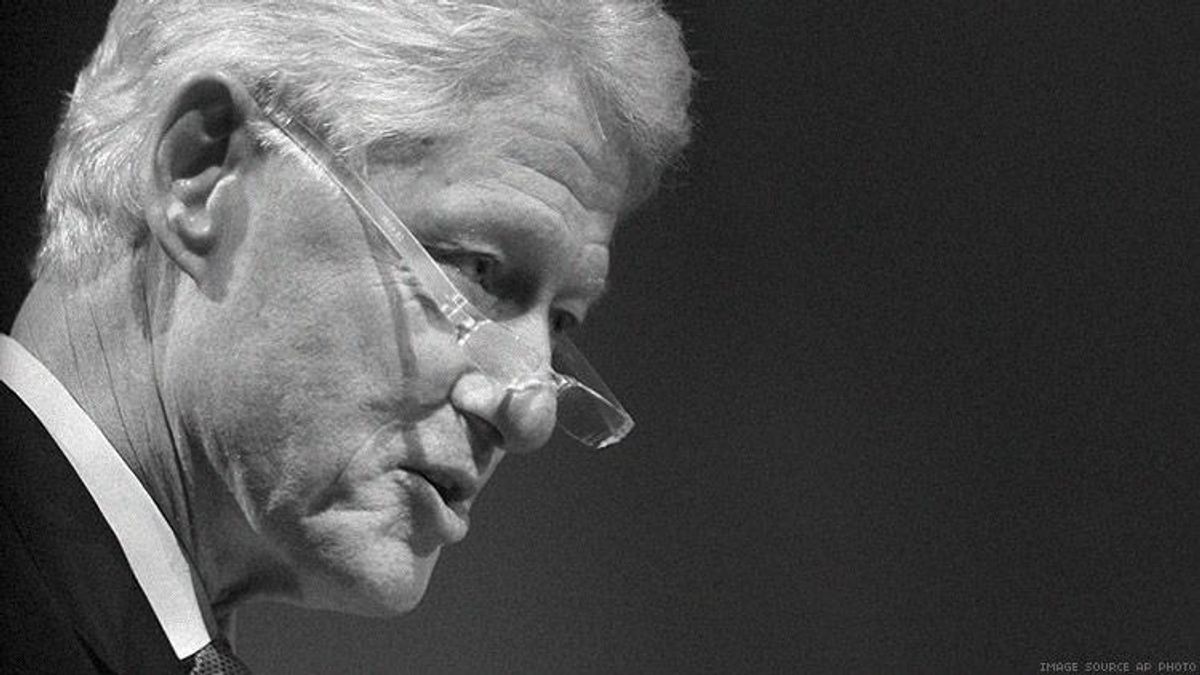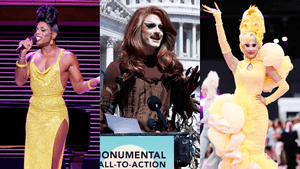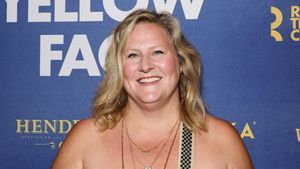By the time former president Bill Clinton took the stage at the closing ceremony for the International AIDS Conference in Amsterdam this summer, he was already following a heavy roster. International leaders, businessmen, and celebrities including Bono, Bill and Melinda Gates, Prince Harry, Elton John, South African president Cyril Ramaphosa, and actress Charlize Theron had all spoken of their passion for ending the fight against HIV.
It was early afternoon on the final day of a weeklong conference when Clinton stepped onstage. It had been a week characterized by daily protests over the International AIDS Society’s decision to hold the next conference in the San Francisco Bay Area in 2020. And some of the more zealous protesters interrupted President Clinton’s speech multiple times.
As did some sex workers, heckling Clinton — whose presidency was marred by a sex scandal — with refrains of “We know you love sex workers!” Clinton, who likely couldn’t hear the specific content of the catcalls due to the acoustics of the room, commended the conference on allowing all people “who come here with a grievance or a concern the right to be heard.”

“Not everybody can be,” he added to applause. “And I appreciate it.”
Still, the jeers continued until security escorted protesters out. It was hard to watch the former president — once admired as much for his ability to connect with 20-something voters as for his ability to converse on wonky policy questions — struggling to communicate with that same demographic, not to mention protesters with whom Clinton mostly agreed. But true to form, the 72-year-old wielded his public speaking skills (and considerable charisma), eventually mastering the crowd.
Clinton lauded his friend Eric Goosby, the famed HIV researcher and Clinton Foundation board member who served the Clinton administration, first as director of the Ryan White HIV/AIDS Program, and later as deputy director of the White House National AIDS Policy Office and director of the Office of HIV/AIDS Policy.
“I first heard about him in the 1980s when he was running an AIDS clinic in San Francisco,” Clinton told the crowd. In an aside, he conceded, “I know San Francisco is in the United States, and I know a lot of you disagree with our government on a thing or two.”
The audience roared with laughter, as Clinton continued. “Put me down in that category.” Eventually they settled and gave him the floor.
Protests against holding the next conference in the U.S. have arisen from many fronts, including opposition to Trump and the fact that many of the delegates invited to the conference might not even be allowed into the country because of new customs and immigration rules. The cost of traveling to the U.S. has also been raised, as it may be prohibitive to disadvantaged groups like trans women, sex workers, and injection drug users, who are most impacted by the HIV epidemic globally.

Clinton seemed to be responding to some of the anger around the setting, by contextualizing San Francisco as an epicenter of the American epidemic, a research hub central to our understanding of HIV, and “a sacred place.”
“Many people died, and all the first battles were fought, and many more died,” he explained. “I’ll never forget in 1984, when a distinguished American diplomat sneeringly referred to my party as the San Francisco Democrats, because we cared about HIV and AIDS. So, you’ll be glad when we get there — glad that we held the conference in San Francisco.”
It was refreshing to see the older Clinton still masterfully navigate issues around HIV, as he has done since founding the Clinton Foundation in 1997, without even glancing at his notes. The elder statesman’s speech was a stark reminder of how far American political discourse has fallen. Can anyone imagine Trump talking about an issue like HIV so knowledgably?
One issue Clinton focused on was UNAIDS’s 90-90-90 goal: to have 90 percent of people know their status, 90 percent of those diagnosed on treatment, and 90 percent of those in treatment undetectable, all by the year 2020. He warned the crowd that in many respects, the world has gone off track in reaching those goals. By doing so, Clinton echoed what the United Kingdom’s StopAIDS campaign (StopAIDS.org.uk) stated earlier in the week at another protest.
StopAIDS is a network of U.K. agencies working to ensure an effective global response to HIV. At the protest, the organizations’ spokesperson, Alysa Remtulla said, “New HIV infections are declining too slowly, with 1.8 million people newly acquiring HIV in 2017. New infections have declined by only 18 percent since 2011. In some regions, including Eastern Europe and Central Asia, the rate of new infections is actually increasing. Nearly one million people died of AIDS-related causes in 2017 compared to the target of reducing deaths to below 500,000 per year by 2020. Just over half of people living with HIV currently have access to treatment with 15 million people still waiting for access to treatment.”
Like Clinton, Remtulla stressed, “We’re at a critical moment in the global HIV response right now. We have the knowledge and the tools we need to end the AIDS epidemic, yet there’s overwhelming evidence coming out of UNAIDS that we are off track to meet the 2020 targets on reducing new HIV infections and AIDS-related deaths. If we miss these targets we risk also missing the Sustainable Development Goal of ending AIDS by 2030.”
We’re already facing “an annual funding gap of $6 billion,” Remtulla said. And, unfortunately, at this critical moment, the U.S. and other countries are actually reducing their funding for the global fight, “with eight out of 14 donor governments reducing funding for the global HIV response in 2017,” according to Remtulla. She argued, “AIDS is not over, but it can be. With just two years to reach the 2020 targets, the leading donors in the global HIV response must reverse current trends and increase political and financial commitment to achieve them.”
Clinton underscored this, saying, “There is no Brexit in the war against HIV and AIDS.” Referring to the fact that none of the Clinton Foundation’s work could have been done without the support of others, Clinton praised the late South African president Nelson Mandela; the governments of Sweden, Norway, and Ireland; The Gates Foundation; Warren and Susan Buffet; Elton John; “and so many others.”
Clinton continued, “I say this to make a larger point: the fight against AIDS worldwide and against tuberculosis, the current effort to reconcile the need to deal with non-communicable diseases without abandoning our efforts, all of these things represent remarkable partnerships.”
Clinton warned that through the combination of complacency and active hostility to global multinational cooperative efforts, there is a serious risk people will lose the sense of urgency that we once had around ending AIDS. They may quit funding the effort altogether, cut back on funding, or transfer their focus to combatting other diseases or health issues (like cancer, heart disease, or obesity).
“There is always a reason to abandon or reduce your efforts in a call in which you have been involved in, which total victory has not been achieved,” he explained. But Clinton argued, “That would be calamitous. As all of you know, there’s been a significant — statistically significant anyway — increase in the new infections.”
“So, what are we supposed to do?” he asked rhetorically. “If you don’t do anything else, I’d say don’t let anybody get complacent. Don’t let anybody think that we don’t have to increase our efforts. Don’t let anybody believe that the only way to deal with non-communicable diseases in difficult settings is to cut back on what we are doing with HIV [and] AIDS, and tuberculosis, in particular. This is just something that we have to face.”
Clinton solemnly reminded the audience that while we have made great strides in reaching our goals around HIV, we can’t become complacent — especially considering the headwinds we face against the Trump administration. He recalled speaking with former president George W. Bush immediately after Trump’s electoral win (over Clinton’s own wife, Hillary). He warned Bush that the new administration would be gunning for PEPFAR (The United States President’s Relief Fund for AIDS Relief). Bush and Clinton reportedly strategized together to ensure Trump couldn’t dismantle the program.
On that note, Clinton reminded everyone that the fight against HIV is in the “possibility business” considering we have already accomplished things that people originally claimed were impossible, particularly before the development of and global distribution of antiretrovirals.
Clinton concluded his remarks, by arguing that holding the 2020 conference in the United States, in the midst of a new presidential election cycle would literally bring its message home in a more potent and profound way than if it were held elsewhere. Many of his supporters agree.


















































































